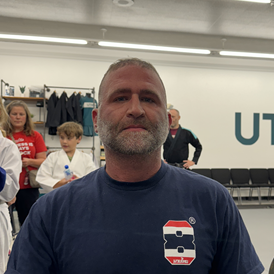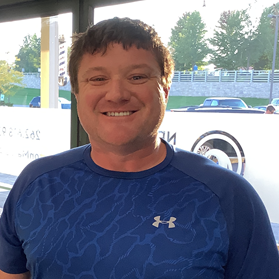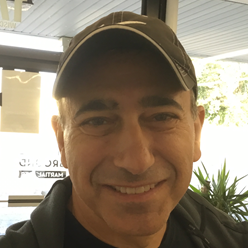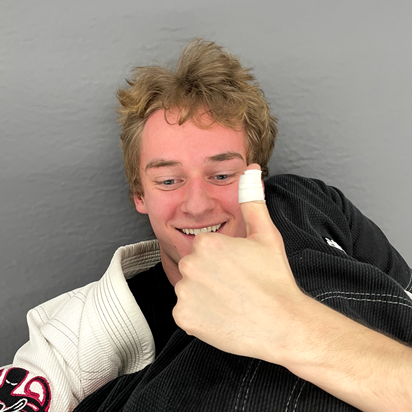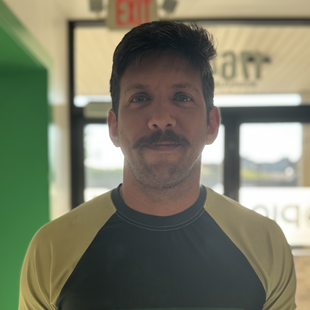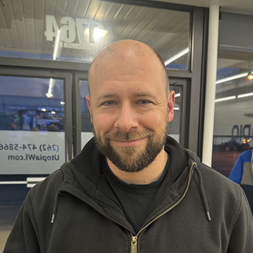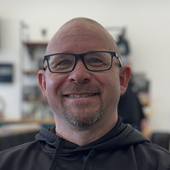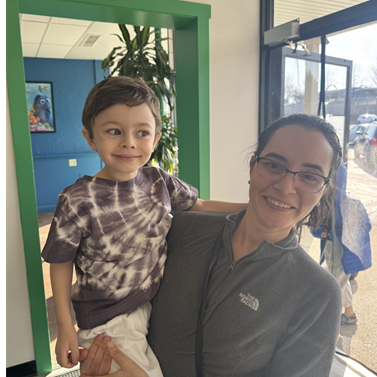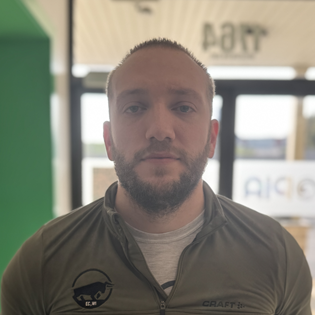Inside the Wave – E012: Sports Psychology with Chandler Lewis
What’s really going on in your head when you’re stuck, frustrated, or second-guessing your performance? Sometimes, it’s not your body that needs adjusting—it’s your mindset.
Coach Chandler Lewis wears many hats—but one thread ties them all together: mindset. In this episode, we dive deep into the mental side of athletic performance, particularly how sports psychology applies to Brazilian Jiu-Jitsu. Whether you’re navigating plateaus or managing pressure from family, Chandler offers tools that translate beyond the mat.
What You’ll Learn in This Episode
The mental game can be the difference between burnout and breakthrough. In this conversation, Chandler breaks down real strategies athletes can use to stay grounded, focused, and confident—on the mat and beyond.
- How to deal with performance anxiety and internal pressure
- Why plateaus are normal—and how to reframe them
- Mental prep routines Chandler teaches athletes for competition
- How family expectations affect athletes at all levels
- Small mindset shifts that make a big difference in training
Standout Quotes from This Episode
- “The biggest breakthroughs come when you realize frustration is part of growth, not the enemy of it.”
- “We don’t train just to win—we train to understand how we respond when things don’t go our way.”
- “It’s not just about performance. It’s about longevity, resilience, and enjoying the process.”
- “Parents have good intentions, but they don’t always know how to support performance the right way.”
- “Mental prep doesn’t start at the tournament. It starts way before—at home, in practice, in conversations.”
Stream Episode 12 Now
🎧 Available on:
About Utopia
Utopia is a community dedicated to personal growth through martial arts. As a space where individuals of all ages come together to challenge themselves and support one another, Utopia embodies the values of mentorship, discipline, and resilience. The Inside the Wave podcast amplifies these values, sharing stories and lessons that inspire listeners to grow on and off the mats.
Why This Episode Matters
Mental skills aren’t just for elite pros—they’re game-changers for everyday athletes too. In this episode, Chandler Lewis breaks down how sports psychology tools like breathwork, visualization, and journaling can help combat frustration, overcome plateaus, and build real confidence on the mats. Whether you’re a coach, parent, or athlete, Chandler’s insights offer a fresh lens on how to train the mind alongside the body. It’s not just about performance—it’s about showing up better, more focused, and more resilient in every aspect of your sport.
Join the Conversation
Like what you heard? Don’t forget to subscribe, leave a review, and share the episode with your network. Stay connected with Utopia and Inside the Wave for more inspiring stories from thought leaders in the martial arts community.
Transcript
Perry: Well, man, thanks for coming on the podcast, Chandler. Welcome to Inside the Wave. This is episode I don’t even remember anymore. But we’re getting up there. And today, I have Chandler Lewis on. Chandler is my wife’s personal trainer, was my wife’s personal trainer. That’s how we originally met. But we also went to the same high school. You graduated with my younger brother. And we got connected because you’ve been studying and have just graduated, finished your master’s in sports psychology. And I thought it’d be an awesome idea because how big psychology is in everything. Super, super important, right? But give us a little bit of background. Dude, you’re a personal trainer, you’re a swim coach, you coach top nation swimmers. What’s your daily day consist of? Well, first off, I think you’re the person that got me into whoop.
Chandler: And I’ve used this tool consistently outside of just myself. Oh yeah, you have like your whole swim team on it, don’t you? That’s crazy. I think it’s a tool for a lot of athletes that they can just manage the recovery process, which for high school athletes, it’s a thing, but as you get older, obviously it’s more important, but it is a thing, especially when they’re training them on the volume they’re doing. But I’m Chandler, you know, when I originally graduated from college, my thought process was to originally be a strength coach. Yeah. And I was into strength conditioning, like I did an internship, I did everything. And at that time, I was really on into exercise science, which led me into finding opportunities into strength conditioning. But now I, Uh, got into swimming full-time coaching, which led me into kind of what I’m doing now. But currently right now, I do a little bit of part-time, uh, personal training. Um, I direct a site of our swimming club, which is called the Schrader swim team. We have about 400 athletes within the program, 400.
Perry: And it’s, so I I’ve heard of Schrader like growing up and I feel like that’s where. all the hardcore swimmers in that area go to. Is that like one of the top swim schools in Wisconsin?
Chandler: Yeah, for sure. I would say within the country every year, we’re typically within the top 50.
Perry: Wow.
Chandler: And we’re going against programs that have anywhere from 1,200 to 1,800 athletes. So to be able to be within the top 50 in the country, number one, you have to have talent. There has to be talented athletes. But you need to have good coaching, very good coaching. And like a long-term vision of the program. You know, I think that the athletes that I coached got me into sports psychology. As an athlete myself, I did deal with a lot of performance anxiety.
Perry: And I was super hard on myself. Did you just do swimming or did you do other stuff too?
Chandler: Yeah, I just swam. And I did have some early exposure as an athlete. with swimming, baseball, tennis, I did all this stuff.
Perry: And I shouldn’t say you just swam, because a lot of times, especially nowadays, if you’re 40 and you’re listening to this podcast, you’re like, you only did one sport? What did you do? Only work out for three months of the year then? Because everyone who’s 40 or 50, everyone did every sport back then. I think it was different in, I don’t want to put you in your generation, because you’re not that much younger than me. Nowadays, younger people are specializing and what they do in one season, they actually do year round.
Chandler: And it’s interesting too, because swimming is, like you’re in a totally different ecosystem. And I relate swimming to things like gymnastics or hockey, where it kind of is, this is what you do. So like our top athletes, they’re deciding that swimming is their thing really early on. I know there’s a lot of research on dual sport. However, in the sport of swimming, when you’re in a different ecosystem, similar to hockey where you have to be on ice, there’s hard to find things that transfer over. So a baseball player, soccer player, track and field, a lot of those sports go hand in hand.
Perry: I’ve had a lot of hockey players come in and do jiu-jitsu. But do you know why? Because they want to know how to fight on the ice.
Chandler: Yeah, totally.
Perry: It’s not like, hey, I need help scoring goals. It’s like, hey, I need to beat up this other guy. Can you show me some fight tricks? It’s like, dude, did you just watch the Mighty Ducks? Stick, gloves, shirt, that’s it.
Chandler: That’s all it takes. It’s interesting. One of my best friends, he’s a hockey player. He does jiu-jitsu. Okay. Do you smell hockey player smell? Yeah. I mean, I would say growing up, my best friends were hockey players and these were physical dudes. They were totally physical. For me though, I liked the early specialization. I enjoyed coming to practice and working really hard and being focused on that thing. And I still think you can find success in swimming, not specializing, but it’s really hard. It’s very hard. But the athletes that I coach eventually got me into sports psychology and just dealing with high performers. And then eventually I remember getting an athlete to the to the level that we call the National Junior Team or the National Select Team Camp. And I got access to having, you know, like USA Swimming’s sports psychologist, strength conditioning, et cetera. And I had a conversation with Dr. Sean, his name is Dr. Sean McKim, but he oversaw Olympic sports. And I was talking to him specifically about a lot of the athletes that I coach, where there’s a lot of performance anxiety. There’s just a lot of things that go into high performance where it’s hard to compete at a high level all the time. Especially when there’s a lot of pressure. And that led me down to, OK, if you want to do this for real, you’ve got to get a master’s degree. So I found an online accredited program, um, which then led me to a guy. His name is Ben Bartel, who I currently work with. And Ben is a CNPC, which is a certified mental performance consultant. And as CNPCs, I always talk about this is their sports psychologist, which is people that have probably have a background in clinical psychology. And then there’s CNPCs, which deal with performance. Okay. And for me, they go hand in hand. However, I want to make athletes better in performance, which, you know, the mental side or the mental game is performance. But there’s this gray area in between that as a sports psychologist, you’re able to identify that this is a this is an area that I can work in. As a CNPC, there’s also this gray area where if we’re dealing with athletes that have anxiety, but they’re having anxiety everywhere else in their life. If that’s someone that I can diagnose as a CNPC, that’s not someone I can work with. Got it. Um, so I’m currently in a mentorship program to get that licensure, um, and taking on clients and it’s been going well. So tell us about championship mind. I know that’s your. Yeah, so Championship Mind is basically a consultant type of one-on-one direct services. We’ve done workshops. Like for like teams or coaches? Teams, coaches, parents, athletes, really whoever that’s trying to get this thing of performance, which I look at performance in everything, right? This is a performance right now, right? And whatever that you define performance for you, Having a CMPC or someone that understands the steps that go into performance, I think is important. Specifically, right now, we’ve been doing a lot of one-on-one work. I remind myself, doing the one-on-one work.
Perry: Now, what’s the difference between what a sports psychologist does in their role, in their job, versus someone who’s just a top-tier coach? Because I feel like top-tier coaches help their athletes all the time with, some performance issues and like, you know, becoming optimal, but like, how is, how’s the tools and the practice that you have as a sports psychologist different than just like, you know, your 50 year old coach that’s just been around the block for forever.
Chandler: Well, I’ve actually thought about this too, where it’s like a lot of the best coaches I’ve had talked about a lot of the things that I’ve learned. However, the big deal for me specifically is, I have athletes that have, they want a CNPC or they want a sports psychologist. As their coach, I could not directly give them services. So for me, it’s like trying to recognize that your coach can provide you with a lot of things. And that’s their role, is to provide these tools. But to have someone outside that role as your coach to provide something with a greater perspective. Like a third party? Yeah. I think is, for some athletes, really beneficial. Now, obviously, there’s extensive work, extensive education that leads you to that. But really, at the end of the day, I think the idea is that’s the specialization of a CMPC. As a coach, their job is to coach. And some of those things might be mental performance. A CMPC or a sports psychologist, that’s all that they’re trying to do is make you better. So I don’t need to know anything about grappling. Now, I want to have an idea of that. I want to have an idea of what are some of the things you’re going through. But the tools transfer over, whether you’re playing hockey, baseball, swimming, which I think is different from my coach.
Perry: So how much, and I think you’re undergrad exercise science, right? And I think that’s a great example, right? Some of the best trainers in the world, right? They don’t have a degree, right? They’re just knowledgeable about the human body and they’ve been trainers forever. And I think there’s a lot of stuff that you can learn in training without an exercise science degree, right? Do you feel that about sports psychology too? For sure. I know you just got your master’s, but as much as you learn in a master’s program versus as much you need to go out there on your own to learn about it, there’s so much more, right?
Chandler: Yeah. And for me, it was recognizing my experience as an athlete. And I used to think like what I was dealing with was not normal.
Perry: Yeah.
Chandler: So like how nervous I got, how much anxiety, how much pressure I put on myself.
Perry: Did you ever pee in the pool because you got so nervous?
Chandler: No, that’s good. I’m not going to say no. I’m not going to say no.
Perry: I was definitely a nervous peer. Like, man, even if I were to compete now, like I just have to go pee and I’ll go pee and I’ll still have to go pee.
Chandler: There’s this big thing in swimming where it’s like peeing in the pool. Oh, is it really? It’s a big deal. Oh, man. It’s like, do not do it. Oh, don’t do it? Because it can cause issues with the air. Pretty sure it’s fine to pee in a pool. Yeah. For me, it’s like, I’m not going to ask kids, hey, are you peeing in the pool?
Perry: Dude, you went to the Cedarburg pool growing up.
Chandler: Yes. Everyone peed in the pool.
Perry: Definitely people peed in the pool. Yeah, anyways, if you pee in the pool, what’s the ratio of pee to water at that point in time? It’s still like nothing.
Chandler: Yeah, I would say that when we’re training, kids are peeing in the pool. There’s no way around it.
Perry: That’s because you’re just a driver, man. You don’t let them out for potty breaks. Yeah, no bathroom breaks. Yeah, I love it. So what are some of the biggest things as a sports psychologist people come to you with? Like, hey, I have these challenges x, y, z. Is it just performance anxiety? Like, hey, I do great in practice, but I forget everything, or whatever it might be when I go out there to compete. Or are there other things that people come to you with challenges with?
Chandler: You know, like the performance anxiety, that was me specifically. I think that a lot of times what people are doing, there’s going to be sports, there’s going to be performance anxiety for sure. And that is a big thing, especially with younger athletes, totally a big thing. One of the other leading things, especially when you’re dealing with high performers, is to try to separate the identity of who I am as an athlete and then what I do, which is really hard. That’s really hard, but that can lead to performance anxiety or that can lead to additional frustration. So for me, it’s like when I’m talking to an athlete trying to figure out what they’re dealing with, it could be performance anxiety, but that might be from X, Y, Z, right? So at the end of the day, the frustration, the confusion, the anxiety, those might be just stemming from an underlying belief or value that they have within sport or what they’re thinking. Feel free to can you diagnose? So kind of I can’t diagnose like I can’t say my job is to to Recognize if this is something I could diagnose Okay, so if I if I’m sitting with an athlete and I’m like, this is general anxiety disorder. Yeah, that’s out my scope Okay So like as a CNPCs, you have to have that background where you can say, this is a diagnosed thing. This is outside my scope.
Perry: You can go to a clinical psychologist or whatever. So I wrestled in high school and man, I was the worst at competing, but I was perfectly fine in the practice room. If you were to reflect on it now. Uh, I think I would just get in my head. Yep. And I’d like, I would literally just get, it’s not that I would go out on the mat and I was super nervous. I would literally just go out there and just not perform.
Chandler: So if this is a big deal. Yeah. So if I, if you were an athlete and you were sitting next to me, I would ask you obviously training or daily practices were your thing. Yeah.
Perry: Why? It’s fine. Why? Cause I was comfortable in their room. Maybe it was just cause like I knew that people I was training with and I knew what to expect.
Chandler: Would you take more risk in training?
Perry: Yeah, probably.
Chandler: Would you have more freedom to take risk? For sure. And the difference between competition, would you not take risk?
Perry: I don’t think I would, but I almost didn’t even get to the point where I wouldn’t take risks. Like I would just go out there and I would just not do like, I just wouldn’t try to win.
Chandler: Yeah.
Chandler: Cause you didn’t have the freedom to take a risk. Yeah. So it’s like a lot of times that’s a thing and trying to get athletes to recognize like, Oh, I’m, I’m embodying these things in training, but when I’m going out and I’m in competing, I’m not doing the things that I know that I need to do. So I take big risk. I have freedom. I’m comfortable in my environment. A lot of times the reason why there’s this big separation between training and competition is because expectations are higher. Pressure is higher. But usually it’s because they’re, they’re making the competition into a thing that is way, way, way, way more outside of the scope of what they should be doing. They’re trying to simplify the job.
Perry: And in training, it’s easy to do that. It’s comfortable. And it was crazy for me because like, you know, I could hang with our state qualifiers in the practice room, but I would go out to a match in a in a meet, you know, in front of a crowd. And I don’t know if it was the crowd that bothered me, but I would go out there and kind of like just be the people competing because it’s not like. It’s not like a team sport where there’s a bunch of other people out there, or even swimming where there’s many people in the pool swimming at one time. People are only watching you and the other person. But man, I was terrible in high school. But two years later, so I wrestled all through middle school, all through high school. I coached Cedarburg for two years. My second year coaching Cedarburg, I found jiu-jitsu and I started competing right away in jiu-jitsu because I was still like fresh. I had no problems competing in jiu-jitsu. Like I would compete the same way I practiced, but better. And it was just, it was so strange to me, like, why the hell didn’t I do that when I was wrestling?
Chandler: My guess is probably because, when did you start wrestling? Middle school. So there’s this idea of like sport specific values that we put on at a young age. So in swimming, it’s very early on whenever a kid starts racing and they recognize, Oh, if I go a best time, people around me are happy and I’m happy. And my coaches are telling me a nice job. And you can relate that to any sport. So early on you develop these. competition sport values, specifically to wrestling. And if you get some early success or you have these values, as you get older, it’s hard to kind of shift those things. So what you’re saying is exactly what I dealt with as an athlete too. And I got better as I got older, but I’ve never been able to identify what I needed to do. If I had myself now, I think I would have been able to be better.
Perry: Yeah. It was just crazy how it wasn’t even like a gradual change.
Chandler: Right.
Perry: I went to jiu-jitsu, and I just competed well.
Chandler: It was just like, wow. New skill, new thing, no values. Yeah. It’s just like, I’m going out there. I’m trying my best. I’m competing.
Perry: And part of it was like, it didn’t matter as much. Yeah.
Chandler: Expectation.
Perry: And I think that’s why it didn’t. I mean, it also helped. I always thought I had to compete the same way as everyone else in high school, where the wrestlers, slap their thighs, they get all jacked up. And I was like, that’s not me, right? I’m not an intense person, that type of intense. But do my first jiu-jitsu match, I was getting ready, I was warming up, I was just jumping, moving around, and my coach next to me just rips the loudest fart ever. And I was like, oh, cool, this shit doesn’t really matter. It doesn’t matter, right? And I feel like that’s what actually helped me.
Chandler: It’s like, you’re trying to simplify the job. Like I’m out here, I’m competing at a high level. I’m doing my best and whatever happens is happens. And like, for me, it’s like the same idea. Put a lot of pressure on racing, a lot of pressure on competition. When I was in training, I was loose. I had freedom to take big risk. Training was my place where I felt comfortable. I got better, but it was hard to transfer it over.
Perry: And I think it’s really, at least for me, it’s, just a shift in mindset. And to me, and I would love to hear your professional opinion on this definition of mindset, but this is from my friend, Mark England, who I had on the podcast, but your mindset is the story about yourself that you tell yourself, right? And I think I had this story in my head that like, okay, I need to be this type of person in this situation. I need to perform this way. versus when I got into jiu-jitsu, my story shifted, right? And it almost shifted overnight in that instant that I was like, oh, yeah, this doesn’t really matter anymore. I can just go do the jiu-jitsu I know. It’s not that I have to win. And this is something I tell my athletes at the gym, and I would love your opinion on this one too. But when my kids go out and compete at the gym, I should say my kids, my athletes, right? I just tell them to go out there and show me the jiu-jitsu that they know. It’s not like, hey, it’s not about winning. I mean, winning’s cool. Don’t get me wrong. We all love to win. But if your jiu-jitsu is more beautiful than the other person’s jiu-jitsu today, you’re going to do a great job. So it’s like, go show me the jiu-jitsu you know. Go do your techniques.
Chandler: For me, the way that you just described that, it’s like high intellect and awareness of what you need to do. With younger athletes, it’s really hard because These automatic negative thoughts are just going to come in their brain. Yeah. Right. And it’s like trying to identify that and recognize that these are happening. And as someone that’s been competing for a while, like I can recognize those now at 13 years old, that was hard for me to do. So for me, it’s like when I’m working with athletes. you can see this pattern where they’re going down these threat detection modes where it’s like, this is happening. What happens if this happens? What happens if that happens? Yeah, you know, those type of negative thoughts, those are gonna happen, right? And it’s trying to embody the things that you know, that are going to be successful. So like, if I ask Perry, Perry, when you’re doing really well, What are you doing well at? What are you doing? And you’d say things like, well, I’m loose. You know, I’m, I’m focused, but I’m calm. Right. And it’s like, okay, when you’re competing, what does it look like? Well, I’m, I’m really focused and I, I’m, I’m over the top focus and I’m nervous and I’m anxious. It’s like, we’re, we’re not embodying the things that, yeah. make you successful. Yeah. So with athletes, the same type of idea, especially younger athletes.
Perry: Now, performance anxiety is obviously a big one. You know, we get we have a smaller kids competition team at our gym. We’re not like a necessarily a competition focused gym. But we give that avenue for athletes that are interested in it. Right. Um, I think about jiu-jitsu a lot like swimming, right? We’re like, swimming will save your life. Jujitsu will save your life. You can end after you learn how to save your life. Like you don’t have to go any further, but then you can also be the fighter, right? You can be the person that’s competitive in swimming. You can be the person that’s competitive in jiu-jitsu. You don’t have to be a competitor to be bully proof, or you don’t have to be a competitor to be able to save yourself from drowning. So I think that’s a big step of it. But not everyone in either of our activities, and we’ll go from sport to activities, are just competitors. So they’re not going to run into necessarily performance anxiety. I mean, maybe you will if you end up in a bully situation, or like, hey, I know how to swim, but I just jumped off a boat and I totally forgot. Right. Right? Like, that would be a major issue. But there’s other types of mental blocks that people get into. And I have two categories. I’m curious your perspective is. One is just like, your shit’s broken. Like I know the techniques, but they’re just not working for me. I think in baseball, they call them like the yips, right? Golf, yips, gymnastics. Yeah. And then in jiu-jitsu, a big one is plateaus. Like I’m not recognizing progress within myself because I’m not comparing myself to the right thing. What other, are there other things that you see show up in sports psychology? And let’s talk about those ones a little bit.
Chandler: Yeah, the yips are interesting. I actually was, I was working with a golfer and he similarly talked about his experience with the yips. Like, they can be really hard. And Simone Biles talked about her experience with the yips. I think that it’s someone that’s becoming very mechanical. Like, they’re overthinking what they’re doing. And so, in swimming, it’s like overthinking a race or overthinking a stroke technique. And it really comes down to simplifying, I think, simplifying the task. So, when someone’s becoming very mechanical and it’s becoming something that is so ingrained in their overthinking of what they’re doing, usually it stems from like threat detection. So, your brain is like thinking about why this isn’t going well. Well, if this isn’t going well, what happens if that happens? And if this isn’t going to go well, then, you know, like I might lose this. I’m not gonna be that good anymore. And what happens if that happens? Those are just threat detection modes. And your brain is designed to do these, like it’s supposed to happen.
Perry: I’ll get many cases of it a lot, especially when it comes to me, like practicing judo with a throw, right? Like I’ll go to make my throw and my coach gives me a cue to correct something. It’s like, okay, I fixed that over a couple of reps, but that’s something else like, because I fixed that, now I’m doing something else wrong that I wasn’t doing wrong before. Then I fixed that one, now I’m doing something else wrong. And it’s like, You just get so frustrated. And to me, at some point in time, I’m just like, OK, we’re going to come back to this later. But what other actionable strategies are there? Man, I keep slicing the ball in golf all the time, or whatever an individual’s version of it. What are some real basic tactics people can use to combat that or break that?
Chandler: Yeah. I mean, I think that the first thing is to wreck, like the athlete needs to recognize that they’re going down this path. Like if you can’t recognize that you’re becoming mechanical and you’re just getting frustrated, there’s no way that you’re going to be able to make a mental shift. And so as soon as an athlete is being able to identify that and recognize what is going on, Then they can begin to start accepting. Like I’m recognizing that I’m going down this path that is not helpful. Now I’m going to accept that I need to do something about it. And currently right now, what I’m doing is not helpful. Like too many times I’m working with athletes. They know that what they’re doing isn’t helpful, but they’re not willing to change what they’re doing. So like, I can’t even get to past recognize if they’re not able to accept.
Perry: And you’re talking about like kids, not just stubborn adults.
Chandler: Yeah, yeah, totally.
Perry: Where they’re still even like, you know, we look at kids and they’re a lot more malleable, right? Because they don’t have decades of built up habits like me and you might have, right? And it’s just crazy to think that even happens to the younger athletes as well.
Chandler: Right. So I think that the first thing that I, if someone was in specifically with this golfer that I was working with, is we started to break down and simplify what his job was. So I asked him, what’s your job? And he would go through a big, big deal of what his job, well, I have to win this and I have to do that. And I have to shoot this and I have to win this tournament. And that’s not really your job, right? Your job is to go out there one shot at a time with a hundred percent effort. And you do that over a course and then you get a result at the end. when people are going through the yips, typically they’re so far ahead of what they should be doing and they’re not focused about these performance objectives. So like I call them performance objectives or just like small controllable specific tasks. So like in swimming, when things are not working well and you’re overthinking or you have the yips, usually it’s like five, six things. Let’s come up with one to two things that you’re trying to execute here that are controllable, that are specific, that you can recognize as something that you can work on. And it could be as simple as something like in golf, where it’s just like, all I’m trying to do is hammer it. And I know that seems like, well, I’m, yeah. But when a kid is thinking about like, I have to move my hips, swing through here, it’s hard to simplify what your job is. So it’s like these performance objectives are small little controllable things. Start giving us a path of what we’re supposed to be doing going forward. And then it’s like recognizing the reactions or the emotions that are coming with these things. So it’s like these thoughts and emotions are threat detections and they’re supposed to happen. And if you allow those, like you can’t control those. I always tell people like you cannot control your thoughts and your emotions and your feelings. You can respond to those and control how you respond. typically when someone is dealing with frustration or the ups, is they’re responding in a way that is not helpful. So you’re controlling the thing, but you’re controlling what is definitely not hot. So it’s recognizing, accepting that, and then controlling the thing or how you respond going forward. Yeah.
Perry: How do you like to, are there like short term fixes you like to, tools you like to give to people to reset, right? I think it’s one thing when we’re talking about like training in the pool, right? And we have weeks to train and we can kind of break that down over weeks. But, you know, jiu-jitsu, we have tournaments, swimming, you guys have meets where you’re doing multiple events in one day, right? And if event number one doesn’t go well, you have to find a way to reset yourself for event number two, right? What are your favorite ways to have athletes like just do a self reset?
Chandler: Well, I think that that’s, that’s probably one of the biggest things that I think as coaches that we deal with. It’s like, Hey, that was one small thing. We got to move on. Like that probably happens all the time. And you see a kid, one bad thing happens and the dominoes into all these other things.
Perry: You get wrecked your first match. And then, you know, you start losing to people that there’s no reason you should have ever lost to them.
Chandler: Right. And that’s the whole idea with sports psychology is it’s not about performing your best when you feel really good. Yeah. Like anyone can do that. It’s like, how can you make those adjustments when things aren’t going well? And I found that the best way to figure that out is like mental performance is complex. And you got to make it simple, right? So it’s like simplexity. So if I were to be able to identify where I was at, so I finished a race or I’m at a competition and things aren’t going my way. If I can’t recognize that I’m doing something that’s harmful, how am I supposed to reset? So the first step is being able to recognize like, this is not helpful. So I like using the green light, yellow light, red light system, which seems very like, it’s so simple. But it’s a tool that gets kids going, oh, I’m in green light. So green light’s kind of like, things are going well. But, and I didn’t make this up. This is from a sports psychologist, Ken Riveza, which is like renowned godfather of sports psychology. But green light’s kind of like, things are going your way. So you’re at a competition, things are just moving, right? It feels great. Like flow state.
Perry: Flow. Yeah, okay.
Chandler: Cool. It doesn’t happen all the time. Yeah. Yellow light’s kind of like, you’re still in control of what’s going on, but you’re starting to go down the wrong path. So maybe you start saying things like, maybe I’m not prepared. Maybe things aren’t going well. I didn’t train hard enough for this. I didn’t train hard enough. You’re starting to do threat detection. And these thoughts and emotions that are happening, they’re out of your control. And if you allow this to happen, you’re going to quickly fall into red lights. Spiral down. When you get in a red light, there’s not much you can do. There’s not much control. Like you’re done for the day. Right. So if a kid can recognize, okay, there’s a trigger. There’s something that just happened here. I had a bad race. What’s my yellow light routine? What’s my routine when I get into this position? Or if I fall into yellow and the red, what do I gotta do to get to yellow?
Perry: Yeah, what are some of your sample routines that you see athletes go for?
Chandler: So one of the, I’ll give a baseball example, cause it’s really, it’s very simple to see. And like Aaron judge does this a lot. Um, so something as simple as, okay, I’m in yellow light and I’m taking a step out of the batter’s box. So let’s say I’m down two strikes. I’m feeling like I’m disconnected. I’m out of control. I’m thinking about what happens if I can’t hit this next pitch. What if I swing and I miss? You’re in yellow light. So what do you got to do? If you keep in that batter’s box, you might fall into red. Or you’re going to overthink and you’re not going to be able to do your job or execute. So my job is I’m going to take a step back out of that batter’s box. That’s going to reset me, number one. Number two, I’m going to utilize my breath. So I’m going to take a big inhale and a gradual exhale. And all that exhale is doing is thinking about letting go or releasing what just happened next. Then the next thing is I’m going to pick one or two actionable things. So it could be like, I’m gonna be focused and resilient on this next pitch. Or dominant and intense. Whatever that it is, something that’s simple that I can embody. Now I’m getting back in the batter’s box. I’m probably gonna be in a better position than I was prior. And it’s like, if you’re at a four, the job isn’t to get it to a 10. Your job is to go from four to five. And if you can get to five, you can get to six. But typically kids go from, I’m at a two, now I’m at a one. Or I’m at a five, now I’m at a four. That’s not the job. Yeah. Um, so something as simple as a breath or just recognizing that you’re going down this path in whatever the sport is, there’s things. So in us and swimming, it’s like, I’m going to go warm down. I’m going to go take care of myself. I’m going to do some relaxation training and just focus on my breath and re-engage on my next race, which I’m going to, I have a race plan. I’m going to start focusing on these things.
Perry: Yeah. Nice. I like that. Um, what about plateaus then? Like, you know, obviously there’s, there’s physical plateaus, right. And you being a personal trainer, you know, I’m, I do, I’m the guy that’s like benched, you know, one 35 for a set of 12 for the last like 15 years.
Chandler: Right. So like, like, it’s hard.
Perry: Like I can’t wait until the day it’s never going to happen where I pick up a 45 pound barbell and be like, this shit’s light today. Like you pick up that Barbara, like it’s still weighs 45 pounds. See, I’ve been on that for a while, like the last two years. I feel like it even gets heavier. But there’s the mental plateaus. Like, hey, I’m not getting any better. Oftentimes, it could be imposter syndrome. It could be a fact that. I’m looking at everyone else around me, especially in youth, right? And especially if you’re working with kids that are in puberty, right? If you’re a late bloomer, for example, and you’re looking at everyone else and everyone else is getting better, it’s like, you know, a lot of it’s just physicality, right? Because they’re going through puberty earlier. Of course they’re getting better because they have more testosterone surging through their body. But adults, it happens all the time too, right? Where we start comparing ourselves to other people. Like, oh man, I started at the same time as this guy, but he just got a strike before I did. How do you handle that as a?
Chandler: I guess a coach as well as a sports psychologist. Yeah. I mean, as a coach, it’s hard to see athletes go through times where it’s hard, right? But as a coach specifically, I recognize that it’s important for those athletes to go through times where it’s really challenging.
Chandler: Yeah.
Chandler: Like, this is going to make you better, right? The person that you become in the process of whatever.
Perry: It’s like the grit, the perseverance. Right. But at that same point in time, It’s so important for people to go through that stuff. So important, but that’s also a make it or break it stage when a lot of people quit.
Chandler: Yeah. And it’s like, for me, it’s like, I went through plateaus when I was swimming and they were the most, like, I could look back now, most critical, mostly physical, mental. Both. Usually the mental led into fiscal on the same idea, right? They wouldn’t hand in hand. Those really go hand in hand. For me, it was like, that was the most critical time. If I were able to pull information like a sponge and say, all right, these are the things that I’m doing that are not helpful, I would be so much better. At the time, I wasn’t able to do that. So as a coach, now I can recognize that this is supposed to happen. Ups and downs in sport, it’s not linear. It’s supposed to happen. But as an athlete, it’s like, what am I supposed to do? So for me, when it comes to plateauing, usually, usually it’s because someone is so focused on an uncontrollable or an irrelevant thing, and they are measuring their progress on things that are just outside their control, not relevant.
Perry: I love when every, I don’t want to say, I don’t like using absolutes, but Almost everyone is guilty of this one. You make up problems that aren’t real problems that don’t actually exist yet. Not real problems, but just like how you can, um, sports psychology, you can, you can, you know, athletes practice visualization, like picture yourself standing on the podium, crossing the finish line, holding up the gold medal, everyone cheering for you. People visualize the other shit and that stuff comes true.
Chandler: And it’s like what you just said too, is like. I think that people get in their head and they start coming up with these ideas that I’ll never be better. I’ll never be able to do that.
Chandler: I’m not good at this.
Chandler: It’s like your brain is doing threat detection and it’s supposed to do it. Like you’re not in control of these thoughts and emotions, but you’re putting value and accepting that thing and you’re gonna make it bigger. And the idea is like, if you think about, let’s pretend there’s 10,000 targets on the wall Your brain is like, where’s the target, right? It’s going all over the place. So it’s saying things that are so irrelevant or so out there that as a coach, you’re like, where are you getting these things? And it’s bad things, right? And the idea is to come up with some controllable specific things. So instead of having 10,000 targets on the wall, there’s five big, big, big red dots. And I say, all right, hit that one, hit that one. The target becomes way easier. You can just hit it right there. When it comes to like as a practitioner or mental performance, it’s like being able to identify what are the things that are in your control? What are the things that you can put focus into? So when I go into training, am I focused on the wrong things? Am I focusing on things that are relevant and that are more on the side of uncontrollable? Or am I focused on my process? my execution, my controllables. And trying to get people to switch to that mindset, they’ll find that whether I’m a 5 or 10 physically, if I’m a 10 mentally, I’m still progressing. And I think it all comes down to the outlook of process, the outlook of uncontrollable, controllable, irrelevant, irrelevant.
Perry: How do you handle, you know, as we’re talking about like mindset and stuff like that, how do you handle, we, we call it at our Academy, at least with our, like our staff, we call it LVS with the little voice syndrome, that little voice in your head that makes you small. Yeah. Um, limiting beliefs, but generalized ones that impact people in their lives. Some of the biggest ones.
Chandler: Yeah, give me some.
Perry: Some of the biggest ones like, I’m not good enough, right? And that trickles to sport, like I don’t deserve it. I’m not good enough for this career. I’m not good enough to have a girlfriend, right? I’m not good enough to win the swim meet, to win the jiu-jitsu match. Or what are some other good ones? I suck. I’ll never be good enough. I’m an embarrassment. Man, one of the best ones, and this one got me real good, is I’m doing good, which is a limiting belief that I don’t have to get any better because I’m already doing good. So perfect one, average sucks, right? This isn’t about like, hey, the average person sucks. It’s every person’s average. creates their own average. And an average is essentially you don’t need to grow. Every athlete is on some sort of average trajectory, whether they work with a sports psychologist, whether they put extra effort in. And it’s like, how do you take yourself off your average trajectory? And it’s like working with someone like you, right? But that’s another killer limiting belief. Look at all the athletes that are at the top of their game, and that is their limiting belief is, I’m the best. Well, you just put a limiting belief on yourself that you can’t be any better.
Chandler: Right. So that’s interesting. So you called, what’d you call it? Little, little voice syndrome. Yes. Yeah. So like I call it like your inner coach and like everyone’s got their inner coach and they’re more than likely their inner coach is not in line with like, if I were to ask you, Perry, what’s the, who’s the best coach you ever had and why?
Perry: Oh man. Um, man, I, I’d have to say my jiu-jitsu coach, John. Why? Um, Because at least for me, he focused just as much on the sport as he did on the impact that that sport makes in your life. And that was the biggest thing. It wasn’t just about the jiu-jitsu. It’s about all the stuff that jiu-jitsu gives you, the friendships, the community, the resilience in other areas, all of that stuff.
Chandler: And if you were to ask me similarly, I would say my collegiate coach. And the reason why is that he was supportive. He cared about me. He believed in me. Yeah. Right. Uh, bigger belief in me than myself. Yeah. Like those types of things. And if I were to ask you, who’s the worst coach you’ve ever had and why can you think, Oh, I can’t.
Perry: And you know who this person is. Okay. Tell me why, man. Um, Like, lack of care of me getting better or not.
Chandler: Lack of care of you getting better.
Perry: Yeah.
Chandler: Anything else?
Perry: Man, that was the biggest one. And I’ll tell you the story really quick. So it’s Cedarburg football, head coach, AD. Here we go. I know exactly. No, this is right. I was a junior on the varsity team. I was getting zero play time, minimal practice time. It’s like, hey, I’m going to be a senior next year. I want to play, but I’m not getting actually any practice right now. So I’m a junior. How am I supposed to keep playing in my senior year and get better if I’m actually not getting even the opportunity to practice? So I actually went with them. And I built up all of this courage to go up and ask and be like, hey, I know I’m on varsity. I’m just not seeing any play time. I would love the opportunity to play more. Can I drop down to JV? And he got pissed at me. And I was like, I’m just trying to be a better teammate. So he just belittled you. Yeah. So I quit. I’ve never quit anything in my life.
Chandler: And then I quit. He was negative to you. He belittled you. He didn’t believe in you. So if I answered the similar question, the worst coach I’ve ever had, someone that, same idea, negative, belittled me. I thought I gave a really good effort. That wasn’t good enough. If I were to ask you, is your inner coach in line with the best coach you’ve ever had or the worst coach you’ve ever had, what would you say?
Perry: We got to talk more about this. My inner coach now is with the best coach I’ve ever had.
Chandler: Yes. And that’s the sign of great, great mental strength. But most athletes, A lot of times when they’re going down these plateaus or frustration is they’re actually in line with the worst coach they’ve ever had.
Chandler: Right.
Chandler: They’re saying things themselves like you suck, which is the exact same thing of what you just said.
Perry: The worst coach I’ve ever had, but it’s so crazy to me. And this is another thing I learned on a, like a mindset. coach certification course I went through, which is not like a real certification course. But what denotes real when it comes to any sort of certification, like accredited? Really just the people that just agree on shit. But one thing we did was we talked about how you motivate yourself. What does your inner voice say to yourself? Do you motivate yourself in a negative fashion? Because some people do. Yes. You’re a little bitch. Live more.
Chandler: You suck. You have to do this.
Perry: And that motivates them. But is that actually helping? Like people like, no, I, I love, I love when people talk shit to me when I’m lifting or like when I’m doing my sports, like not helpful, not helpful, not helpful.
Chandler: Like science says, like really what you want to do is treat yourself like you treat your best friend. Yeah. So your best friend is going through a plateau and things aren’t going their way or like results just aren’t going their way. Are you going to go up to him and say, Hey, you suck. You’ll never be good. That same person probably treats her best friend like shit, too. You probably wouldn’t say that. You’d be like, hey, you can do this. Let’s focus on x, y, z. And it’s trying to get kids, athletes, whoever, in line with their inner coach should be in line with the best coach that you’ve ever had. So when you’re going through a plateau, you’re going to be in line with things that are just not helpful. And it’s hard to make that adjustment. But even just a positive self-talk is so important. It’s so important. And just recognizing when you’re going down that path of negative, negative, negative self-talk.
Perry: Yeah. I’ve actually done the exercise of writing down both of those. Because I feel like at some point in time, as an athlete, especially if you’ve been doing it for years, you’ve had both. And over time, you just figure out which one serves you better. And we all typically come to the same response. But literally, the exercise of writing down the devil on your shoulder, giving him a name. What song are you listening to when he’s talking to you? Because we know how powerful music can be when getting ready for sport. What are the words that they say to you? How do they talk? What voice do you hear him in? What do they look like? And then doing that to your, what do you call that? Your good inner coach. Give that a name. What song are they playing for you? What are they saying to you when you go out there? What are they saying to you when you’re doing it? How do they congratulate you? What do they look like? What does their voice sound like? How do you hear them in your head? And I think it’s super powerful. If you can hear those two things in two different voices, Man, that puts a huge different factor in it, because then you know who you’re talking with.
Chandler: And you can recognize which one is helpful. So that’s like threat detection mode awareness, where it’s like, that’s going to happen. You know that voice is going to come in your head. I’m not prepared. I didn’t train hard enough. Things might not go well. I’m an embarrassment. That’s going to happen. Those thoughts, emotions, feelings, they’re going to happen. The way that I respond, I’ve got this inner coach and it’s super strong and I’m gonna be confident and resilient. And these are the things that I’m gonna be doing. Let me focus on X, Y, Z. It’s like, if you can refocus like that, where it’s like you’re controlling that inner coach in a way that’s responding to that threat detection. You’re going to be successful and you’re going to have more control.
Perry: How do you like to develop this inner coach in your athletes? Because like it’s one thing to do it in yourself. Right. Because like you said, you’re in control of what you’re in control of. Right. And when you once you have awareness of it, you can do it. But how do you how do you help relay this concept to. the kids and the athletes that you work with to help them out with it. Or even, man, it applies to even like your 60 year old client personal training, right? Like same shit.
Chandler: Right. It’s the same thing. And, you know, like being aware of what, like what you were just saying, where I wrote down what my brain is saying, both the bad things and the good things, like being able to start there and identify that is like huge awareness. Most people can’t do that. Like they’re not going to sit down and be really honest of what they’re saying to themselves. They just won’t. If you can start identifying those two things and then you can start recognizing these are actually the things that are helpful. These are the things that help me. You can then begin making progress. But one of the things that we always talk about with athletes is when you’re competing, you have to have something that you’re trying to embody, someone that you’re trying to embody, right? There’s the things that are really helpful for you in performance, and then there’s things that are not helpful for you in performance. Coming up with a plan of these are the things that when I’m performing at my best, I’m doing really well. More than likely, when you’re doing really well and you’re in that flow state, you are not saying those things to yourself. That’s not happening. You’re like, it’s like a boxing match, you know? And in the end, who’s going to win? Is it going to be the inner coach or is it going to be threat detection? When you’re performing really well, that inner coach is winning. And it’s taking those automatic negative thoughts or ants and just smashing them. And when it comes to athletes, it’s like, we’re going to put a name to these thoughts. So like ants, automatic negative thoughts. What do we got to do with ants? We’re going to smash them. Right? What are you going to do to smash your ants? And it comes down to, like, how are you going to embody this competition? What are some actionable things, regardless of how things are going? So you’re not racing well, or you’re not competing well. Things just aren’t going your way, which happens. Yeah. What are you trying to accomplish? What are you going to embody? So, like, I’m going to be confident and resilient, regardless. Like, if I can embody that, regardless of how things are going, I’m going to be successful. I’ll learn something. Yeah.
Perry: Do these ants ever go away? No, I mean, I still have mine, but like from a psychology standpoint, like they don’t ever go away. I think, I mean, me just, I feel like I knew that, but I think it’s important for, to make sure kids know that, right? Like, Hey, this is something that’s always going to be there. Right. And you just need the, you need the tools to be able to work with it when it pops up.
Chandler: It’s funny. Cause I was talking to this athlete and I asked her, I said, what can I do for you? Simple question. She was like, I don’t want to think negative anymore. And I was like, I’m not sure I can help you there. Because your brain is designed to do this. When there’s competition, your brain is going to threat detection. If you’re approaching it like threat detection, if you’re approaching it like competition is here to make me better, challenge me. Like this is exciting, which is very hard to do. naturally your brain is going to try and keep you safe. So it’s going to do the things like I’m not prepared. It’s going to tell you that things aren’t going well, that this might be a failure. It’s designed to do that. So it’s like being able to refocus and control your response to the threat detection.
Perry: So it’s like the recognition, we’ll use plateaus as an example, like plateaus will always exist, right? But it’s, how long do you spend in that plateau? Are you able to overcome it in a week? Do you have the tools to do that in your toolbox by working with a therapist, a sports psychologist, an awesome coach? Not even every time. They might have given you tools 10 years ago that you can use every single time that, more often than not, help you get out of it quicker. But I think that’s the biggest part. It makes it way easier when you’re like, oh yeah, these happen. It’s par for the course. For me, it’s a recognition that I have grown and that I am on the right track. A lot of times, you recognize the growth, but then you get in a plateau. You’re like, oh man, I’ve actually been growing a lot. I hit a plateau. That’s awesome.
Chandler: Right. This is a great opportunity. This is like, it’s going to be challenging. It’s a great opportunity. Having that outlook is hard, but it’s like, you’re going to pull, you can pull a lot of, a lot of information on this. That’s what I always tell athletes too, is like when you race, there’s going to be a process. There’s going to be things that you’re going to do. And in the end you get a result. Yeah. Same thing in competition for you, you’re going to do these things. And in the end, there’s gonna be a result, the result, like it doesn’t really matter. But the result really matters, because there’s going to be some big information that you can pull from. Now, if you’re looking at the result is the only thing that defines success, then you’re going to ignore all the information that’s going to get you to the next level. So like, if I were to paint, this is a great picture that I painted to an athlete before. You go to a meet, it’s really bad. But you do your absolute best and you’re trying your best and you’ve got these performance objectives and you’re staying in your mental game. And after the meet, you’re able to pull some information. So I need to work on X, I need to work on Y, I need to work on Z. Really bad meet, results were really bad. But for the next two or three weeks, you focus so much time on getting better on these X, Y, Zs that you pull from. You go to a competition a month from now. Yeah, really good competition. Was that competition weeks prior? Good or bad? Yeah, pretty good.
Perry: Yeah, probably important.
Chandler: Really important.
Perry: It’s really hard, like balancing the short game in the long game, right? And I can imagine even more, especially at with with youth at certain points in their career, like there are make it or break it events depending on what your career goals are, right? Like if you’re chasing a scholarship, there might be one meet, one meet that that scholarship’s riding on because there’s a scout there, right? Like for me, you know, I’m 37, man. I’m not trying to win worlds. I’m not like a big jiu-jitsu competitor. I can play the long game. So I have the mindset of like, oh, I can hit a plateau. Doesn’t really matter because I don’t have a, a make it or break it target that I need to aim for. It’s not like, oh man, I need to have this happen by the time I’m 40 or whatever it might be. I don’t have to get sponsored by Element before my next podcast. But Element, if you want to sponsor me before your next podcast, you should. There we go. But how do you work with athletes on that? Because there are meets that are going to be tournaments. golf tournaments, basketball games where, hey, that’s the day that the scouts there.
Chandler: Yeah. And unfortunately that’s like the name of the game and score is like, there’s, there’s these pressures situations that you’re going to be put in and there might be, there’s going to be expectations internally and externally. But you would say the mindset you have is probably the most beneficial thing for your success. Right? So it’s like, how can we get an athlete to be thinking in that direction? And if they’re thinking more controllable, the thinking process, it’s going to be helpful for sure. But naturally, there’s going to be pressure and expectation. And for me, it’s very hard working with youth athletes for them to see the future. But if you were to simply pose the question to an athlete, in 20 years from now, what do you want your teammates to say about you at your Hall of Fame speech? What would they say? And usually they’ll say stuff like, I was a good teammate, I was resilient, I worked really hard, whatever that is. At the end of the day, are they gonna be like, well, they went this time at this competition, they won this time at this competition. It’s like we’re trying to reframe competition. And we know that we’re trying to get out there and compete at our absolute best level. And whatever happens, happens. I know that there’s a lot of pressure, I know I have to perform. But at the end of the day, what am I really trying to get better at? I’m just going out there, I’m doing my job at X, Q, and X, Y, Z, and I’m going to compete at a high level with my high performance mindset. And that’s super challenging. But it’s like, if I were to ask you those questions in 20 years from now, What would you want people to say at your Hall of Fame speech? It’s not going to be times. It’s not going to be results. It’s going to be, you know, I did this. I was a good teammate. I support this person, et cetera. It’s trying to get kids back into the idea of why do you do this? And so for me as a practitioner, it’s like the three things I’m trying to do. First, I’m trying to give you tools. So we’re going to talk about red light, green light. We’re going to talk about meet scripts. We’re going to talk about the funnels. We’re going to talk about journaling. We’re going to talk about all the things, how we can handle performance anxiety, the yips. Yeah. We’re going to talk about all those things. We’re going to talk about why they help. Like these racks, PMR relaxation is really helpful. Red light, green light, being able to identify, really helpful. We’ll talk about why. But the big thing that gets all these things going together is to reconnect on why. Why do you do this? Why does this mean so much to you? Yeah. Why are you doing this currently right now? And it that to me is the circle. And if you can do that with athletes, they’ll perform better. Yeah.
Perry: All right, man. Yeah. So that that why I think is is a missing thing. Right. I know my why in jiu-jitsu, and why I like doing jiu-jitsu, and why I’m on the mission that I’m on. But I’m also 37 years old, and I have a pretty good picture of that. But what do you typically find is the why for 13-year-olds? Do they have a why?
Chandler: Yeah. If you were to really challenge. Because I want to. Yeah, but it like because my parents want me to yeah, hopefully not But it’s like if someone’s it’s if someone is working through some type of mental Performance thing it’s gonna be hard for them to manage and Like all those three things, it’s been very hard to manage what is my why. But if you were to really challenge and you were to ask, hey, why do you do this? And you were to keep on challenging, it might get down to something like, I just really like going out there and competing. I really like challenging myself.
Perry: I enjoy it, it’s fun.
Chandler: Yeah, I enjoy getting out there and challenging myself to the best of my ability. I mean, that is a why.
Perry: So what about when the why is… tied to because I’m good at it, right? Because a lot of times, athletes will get good at something, and then they’ll just keep doing it because, hey, now I am good at it. So they’re wise because they’re good at it. And I win. I get gold medals. I get high fives. It makes my parents proud. But it’s not tied to their own identity, right?
Chandler: Right. And see, that is the thing that is super challenging, is your identity is based off the results of what you’re doing, right? I think that’s very challenging because it’s very hard to shift someone into who did you become in the process here? Like, who did you become in the process of becoming successful? Well, you know, I learned these really valuable skills of resilience and hard work and being a good person and a good teammate. And I worked through challenges. Like, I think for me specifically, if I had an athlete that over-identified with who they were as I’m the swimmer or I’m the person. It’s being able to identify like, what are you actually really good at? Is it the swimming ability or is it the things that, you know, like you’re really resilient, you do things really well, you listen well. It’s like tying back into those process things.
Perry: Now you work with, athletes, some sports just have a natural end life, right? Like football, high school and life, unless you turn into college, which is like you trickle down and then pro is even less, right? There’s not really like rec league for contact football, right? Swimming, you can do your entire life, but I’m not sure at some point in time, like competitions pretty much stop. Jiu-Jitsu doesn’t really stop. Cause you can always keep competing though. You know, there’s tournament divisions for 50 plus year olds, which I think is a really cool benefit of jiu-jitsu if you want. There’s not like a natural end to it until you’re like literally just too old to grapple anymore. But what about dealing with athletes in sports that has an end life?
Chandler: Yeah. I mean, that’s why it’s like in 20 years from now, what do you want them to say about you? Because you’re tired. You’re, ah, yeah, man. Because it’s about the person you become in the process of whatever the goal that you have, right? It’s like, these are the things that really are going to help you, right? There’s these time management skills. There’s these resilience skills, these self-belief skills. It’s like, those are the things that are going to set you up for life. So like, specifically as a coach, These are the things that I like to talk about.
Perry: Man, if I sat down with, how long have I been out of high school now? So I’m 37. I’ve been out of high school for like 20 years, right? We were talking about 20 years after. 20-year reunion. Dude. I don’t know if that’s the thing. But if I sat down with all my wrestlers, one of them would already know the answer because he does jiu-jitsu with me. But they would all look at me and be like, dude, this dude’s still doing wrestling and grappling. Yeah. I just never stopped. I found a different avenue to continue grappling. There’s a lot of other sports. Like you just can’t, you can’t do that. Yeah.
Chandler: It becomes the end. You do it recreationally. Yeah. But it’s not the same as the, the, the, the same feeling. Like for me, there is master swimming. Yeah. Like I could still compete. Yeah. But I don’t feel it did not give me the same. It does not give me the same enjoyment as you’re going out there. You’re going to be in a high performance mindset and you’re going to go compete.
Chandler: Like that’s not the same. Yeah.
Chandler: Yeah. Yeah. Um, and it’s, That’s why it’s so important where you’re trying to reconnect on why are you doing this thing? Why do you show up to practice? Why do you really care about your goals and your commitment and what you’re doing on a daily basis?
Perry: Yeah Man, let’s talk about parents and athletes. Yeah, because we both we both deal with those and You you more so cuz you have a super competitive team, right? Like all of all of your athletes compete, correct? What do you yes hundred percent not all of mine, you know, we have what do you deal with with with parents?
Chandler: Like what are some of the things that man?
Perry: I shouldn’t say what we deal with parents because we do so we run an in-house tournament at our Academy that we have You know, we have 200 students at our Academy about for kids I think our last one we had 80 of them compete And not even all of them can compete, because we don’t let our three and four-year-olds compete. So there’s a subset that even can’t. But as part of our tournament, what we do is we coach the parents. We send videos to the parents like, hey, here’s how you should interact with your kids before. Here are some things you can say to them. Here’s how you should interact with them during the match. Here’s helpful things to say after the match. Remember, you’re the parent. We’re the coach. Like, we set expectations and boundaries around that, like, this is your job, this is our job, this is the ref’s job. But man, like, if you go to other tournaments, or if I look back in the wrestling days, like… Man, you get the parents living vicariously through the kids. Man, you get the parents that will yell at the coach, yell at the ref, like, man. Tell their kids to have good sportsmanship, but they don’t have good sportsmanship to the other team’s parents. It’s a Wild West, man. We don’t run into that at Arcadia. You don’t run into that ever? Well, we’re just so… I wouldn’t, I would not allow it at our academy. Like if, if that were to happen, like we, we would be parting ways.
Chandler: Would you say that part of the sport naturally is that respect though, where it’s like, this is their job for sure. You know? Yeah. Where it’s like in sport, more organized sport, like swimming. Yeah.
Perry: Where it’s like, I mean, I’ve recognized, I mean, I’ve, I’ve recognized, I’ve seen it. I’ve reffed a lot of jiu-jitsu matches and it’s like, you know, you start getting yelled at by a parent and I’m like, yeah, I’m not talking to you.
Chandler: Yeah.
Perry: This is not your job. It’s like, if you need me to disqualify your kid because of you, I don’t want to, but I will kick you out of the gym. And if that means your kid needs to leave too, then sorry.
Chandler: Yeah. Like it’s not, unfortunately this is like, uh, this topic has been something that I, you know, we do our club specifically. I think we do one of the best jobs of trying to communicate to our parents. Yeah. this is what we’re asking from you. And as coaches, this is our job and this is what you’re gonna be expecting from us. Like I think as a team or organization, we do that really well. Unfortunately, it’s a thing, right? And the things that are on the line, whether it’s collegiate performance or social comparison, my kid’s better than yours. Like those are things that I know will happen regardless of whatever that you’re doing. However, it is one of the most detrimental things that I’ve seen in mental performance, but also mental performance. Because now you’re putting the result on the thing, and they’re already going to be thinking about these uncontrollables. Now you’re emphasizing these uncontrollables. You’re emphasizing the result. You’re not focused on the process. And the athlete has such a hard time of connecting what’s actually true. So like if the language of the parent is saying one thing and then the coach is saying the other thing, there’s going to be this cognitive dissonance of what’s actually true.
Perry: So how do you coach your parents to… not coach. What do you tell them their job is?
Chandler: Yeah. I mean, as parents, and this was like my whole thesis. Okay.
Perry: What was the title of your thesis?
Chandler: Parental Performance Expectations and the Effects on the Wellbeing and Performance of Youth Athletes. Oh, wow. Okay. So you could go very extensive into this and you could talk about the long-term effects and so on. And that’s really what I’m looking at. And like early exposure. So when kids are joining our program at 6, 7, 8, this is when we have the most amount of impact. Most amount of impact. And earlier we talked about sport values. Those sport values can be impacted by your parents tremendously. So early on at six, seven, eight, your parents are rewarding the results or saying, you’re so good. Look how talented you are. You can do this. You won this event or overanalyzing your performance. So giving feedback when not really that important for your job. trickles down long term where now I’m coaching them at 16 and they’re just focused on outcome. They can’t even see process. They’re so identified by who they are as an athlete and they can’t separate their identity of who I am and myself as an athlete. So it’s like a lot of the things that we’re dealing with as coaches is impacted by parents early and very early on. You know, a 16 year old doesn’t have the same amount of impact as a six, seven year old. Yeah. Um, so for me, it’s like, you have to reward process very early on.
Perry: I mean, I think, I think a big thing is, is you need to reward. And I tell this to our coaches as well as our parents, but you need to reward the child for their. Yeah, like I love how hard you worked out. Yeah, like that’s a great one. Like, like, yeah, I mean, it’s, it’s, it’s, it’s, it’s, it’s, it’s, it’s, it’s, it’s, it’s, it’s, it’s, it’s, it’s, it’s, it’s, it’s, it’s, it’s, it’s, it’s, it’s, it’s, it’s, it’s, it’s, it’s, it’s, it’s, it’s, it’s, it’s, it’s, it’s, it’s, it’s, it’s, it’s, it’s, it’s, it’s, it’s, it’s, it’s, it’s, it’s, it’s, it’s, it’s, it’s, it’s, it’s, it’s, it’s, it’s, it’s, it’s, it’s, it’s, it’s, it’s, it’s, it’s, it’s, Hey, you listen to your coach amazingly. Like, oh, like that is the stuff that will truly make a long-term impact on that, on a kid, right? In a positive way. Everything can make a long-term impact on the kid. We want to make a positive long-term impact. Right.
Chandler: And for me, it’s like as a coach, having a background in psychology and then going down this route of getting my CNPC licensure and working with athletes outside of sports swimming, Can so quickly identify when there’s external factors going on within an athlete like it is so clear It’s so clear as day that there is someone else that is telling them XYZ.
Perry: Yeah, it’s it’s getting it It’s getting in the way of their performance or even when something’s just going on in the outside world like hey their parents got into a fight the night before totally you could tell that
Chandler: The minute the kid shows as soon as they walk in you go that and if and that’s like something’s going on today That’s a resemblance of a good coach. Yeah, if you can and I can do that like a kid walks in.
Perry: Yep I already know something’s going on and yeah It impacts everything and part of it too is like do you do is that a day that you need to push the kid? You need to dig into it. Do you need to give them space be like hey, you know Maybe today is just not the day to practice, or push it hard, or do this instead sort of a thing. I definitely think that’s a powerful thing.
Chandler: Right. So Mike, my greatest thing. What I would recommend to parents is just to let your kid go out there and have freedom to compete. They need to have the freedom that regardless of what happens, you’re still mom, you’re still dad. I’m still mom and dad, I still love you. Your performances do not dictate who I am. And whether we like it or not, children, kids, even adults, they look to their parents for validation.
Perry: What about coaching parents around letting their kids make decisions not based on the longterm, right? We know it’s like a proven fact. Kids do not make decisions based on longterm impact, right? Like, uh, you know, today I want to quit swimming. Like, well, it’s just because something that happened in the last two hours and you’d rather play video games and the parents like let them do that. How do you balance that where a lot of times the parents can be super helpful. But a lot of times, they can also hurt from that standpoint, too, whether it’s making the decision for the kid or letting the kid make a decision that that kid doesn’t really realize the trickling impact of it.
Chandler: Right. So one of the biggest things with kids is they need to feel a sense of autonomy. Especially nowadays. Yeah, they need to have some autonomy. However, there needs to be some support. So like you’re recognizing that this kid is emotional and making an emotional decision that I want to quit, right? Being able to walk a kid through that was like, why do you want to quit?
Chandler: Well, I had a bad day. Yeah. And it’s like, okay. As a parent, there’s some great opportunity there where you can know you are such a hard worker. You’ve been showing up, you’ve been doing the right things, your teammates love it. It’s like that. What an opportunity to step up, right? Great opportunity. Framing it that way. And then like as a parent, that’s your job. Big support.
Perry: What about the overbearing parents? Yeah, it’s helicopter moms. Yeah. Which is even worse, what’s the other term, like a, oh God, what is it? A lawn mowing mom? Yeah, and there’s- Where you have the helicopter mom, where the kid helicopters back to the mom, but then you have the lawn mowing mom, where the mom is literally by the kid the entire time. Making every decision for the kid. Which as a coach, You build that relationship with that parent. They become one of the best parents at your place. Yes, but I Don’t know about you, but there’s been times. We’re like we’ve had a not kick parents out of the Academy, but like hey We want to try a slightly different approach today, you know, would you mind leaving class for you know 20 minutes? So we can you know work with your kid more one-on-one without you around. I Yeah. Do you ever have, every once in a while you’ll get a totally different kid if mom’s there or if they’re not there. Right. And it could be a hundred percent better of a student or better of an athlete, right. You know, either not distracted, not trying to impress, just doing their thing, being more natural. Yeah, man.
Chandler: Yeah, you’re not giving like, the biggest thing is autonomy. Yeah, your kid needs to have autonomy. And you can give that by recognizing that this is their thing. Yeah, right. Me being overbearing, maybe short term is going to help. Like short, there is like 100% you being overbearing at an early age, like we’re going to work hard, I’m driving you to practice, you’re going to do the right things you can. Early on, that could produce very good results. Like it will. If there’s high expectations, high standards, like as a parent, if you do that to your child, you will get results early on. And it might be at 10 years old. However, if we’re thinking about long-term performance, what’s that athlete gonna be like at 16? They’re going to cut off mom real quick. Yeah. And things are going to go down South and they will not have autonomy. Yeah. Burnt out. Totally. Yeah. It’s just going to be totally South. So it’s like you have to recognize that at an early age. whatever that they’re doing is, this is their thing, right? And like, we can provide support, but if the perception of the athlete is that you’re overbearing, it’s not going to work. So it’s, it’s communicating with your athlete of what they’re feeling. You know, it’s like, there’s no problem with a parent going to every competition. Like my parents never miss competition, but I would swim a race and they’d be like, Oh my gosh, that was so great. And me internally, I was like, that was so bad. I was so far off from my time. And I would get really frustrated. But I look back at it now, I’m like, wow, I was so lucky to have parents that were just there supporting me.
Perry: Well, and I think that’s a big part of a coach, right? You have to remember when you’re coaching a student athlete, you’re coaching the family, right? Like parents don’t know how to be parents of an athlete. Someone needs to coach the parents on how to be parents of an athlete. And when your kid gets smashed on the mat, you know, blown out of the water in the race, you don’t go tell your kid, Hey, you did great out there because you’re, you’re creating a, like a discongruency between what happened and how they feel.
Chandler: Right.
Perry: Like you need to validate how they feel. And that’s where it comes in. Like, Hey, you, you didn’t get the results that you wanted today, but did you work as hard as you, as you thought you could, right. Did you put in the effort? Um, you know, did you have the same focus? And to your point, like, you know, what can we, what did we learn? What can we work on? What’s next? What are we doing tomorrow? Right. How can I support, how can I support you?
Chandler: Yeah. What can I do to help you? Yeah. You know, like those are, those are things versus telling them, yeah, you need to get better at this. Things aren’t going well. We’re going to call your coach. Hey, you got to work on your triangle. It’s like, we’re going to call, we’re going to call coach and we’re going to figure this out. It’s like, Ooh, my threat detection is now going. Mom’s upset.
Chandler: Yeah.
Chandler: Dad’s upset. These results aren’t good. I’m not good enough. Just like a lot of times when people have problems, like what I’m working with, uh, with an athlete that’s having problems where they’re over identifying with results. If you were to challenge and get down to the inner belief, it’s going to get down to something that’s really hard. Like when I don’t swim fast or I don’t compete well. I think that I’m worthless. And that was from early on, that type of stuff. And you’re just enhancing that if you’re early on exposing kids to like pressure or expectations.
Perry: Anything else on parenting? Otherwise, I have one final question for you before we do some rapid fire stuff. All right. So my question for you, a lot of times as a personal trainer and as a coach, Chandler right now is not a sports psychologist, right? As a coach and a trainer, a lot of times we talk about, hey, of my 100% training in a week, x amount should be for sport. X amount should be for like supplement training, like strength training or land speed training or whatever it might be. Jiu-Jitsu world, that might be, you know, hey, 80% of my training should be Jiu-Jitsu sport specific. The other 20% should be strength training or another sport that will supplement it like wrestling or Judo. Being a sports psychologist, How much of an athlete’s training should be on average, right? Because it’s going to be dependent if it’s a novice or a pro. How much of it should be to sport, to be to supplemental training, physical, and then how much of it should be mental?
Chandler: Yeah, so it’s funny. So if I were to ask you, I’m Perry the athlete. Perry, how much in jiu-jitsu is it mental? What would you say? All of it.
Perry: Like, and I think about it all the time.
Chandler: Okay.
Perry: So like kids, I ask this question all the time. Our drive home from the gym, when I’m done, I like, I run through like, how did I do? How did I teach? How are my students doing? Like even to the gym, I will think about jiu-jitsu, like literally on purpose, not just be like, oh, I daydream about jiu-jitsu. Like, no, I think about jiu-jitsu All of the time. Yeah, I will fall asleep at night doing it just to match in my brain It’s that’s that’s as a coach.
Chandler: I can relate to that because I can’t turn it off. Yeah, I’m thinking about coaching all the time However, I asked athletes this all the time. Hey, how much of your sport is mental and they’ll say stuff like 50% and you’re like, okay. Are you spending 50% on your mental game? I Yeah, yeah, right. So for me, it’s like, there’s a balance and intertwining of all these things, right? And there’s very immediate things that you have to do. So like, if you’re not training on a daily basis, it doesn’t matter how positive you are, things might aren’t going to go well. So like, obviously, like training is very important competition. Daily process is important. That mental piece is in line with what you’re doing on a daily basis. If you can tap your mental game in and you’re training really hard, it’s just a piece of a puzzle. So like all this stuff matters, but they’re intertwined with each other. So like as a sports psych, it’s like, I’m gonna say like, it’s very important. It’s super, super important that you’re intertwined on a daily basis, your mental framework, like how you’re approaching things. What you’re doing and whether that’s like meditation, visualization, journaling does not matter. There has to be a framework in training. If you’re just going to training and your thing is, I just work hard, you’re missing. And there’s a lot of guys that I know. that like, let’s just use the gym. They go to the gym and they just work hard. But they don’t sleep, and they don’t eat well, and they do all these other stuff. And they ask themselves, well, why do I feel like shit?
Chandler: Why do I not look good?
Chandler: It’s like you’re just doing one of the things. Similarly to sport, I go to practice and I work hard. That’s one of like many things. And if we neglect something like the mental framework, man, this doesn’t, if that’s the only tool in your toolbox,
Chandler: Yeah.
Chandler: It’s not really helpful. It’s like we’re trying to build tools in our toolbox. Yeah.
Perry: The mental framework is huge. Man, the most wild thing, and we were going to touch on it earlier, but totally forgot. In reality, everything today, we’ve just been talking about high performance, no matter what you’re doing. You know, our vehicle for it and our domain is sport, but like this could be career high performance, like whatever your thing is and you want to be a high performer, like all of this stuff applies to it all.
Chandler: Right. Like how there’s been many times, especially early in my career, like as a coach. Yeah. where I need to also have a mental framework. When I go to practice, my body language, the way that I’m talking, the way that I’m executing things, I have to have a game face, just like the athletes do. I have to review what went well, what didn’t go well. When I’m at my best, what am I doing really well? Because there’s been times where I’m at meets and I’m just not feeling the best. I might have an energy that’s just not good. If I were to ask the question, Chandler, when you’re at your best, what are you doing really well? I would be able to identify very quickly. It’s like me as a coach, I need to also execute mental frameworks. I talk to people all the time where it’s like, you may not be a high performer in a sport, but it relates. The tools are the exact same thing. Nice. I love it.
Perry: All right, man, let’s wrap this up with some rapid fire questions. We’ll do like three each. I’ll give you one, you give me one. And then we’ll give some people some ways to work with you if they’re interested in working with you in the future, or if they want to get their kids into swimming as well. All right, first question for you. What’s your go-to workout song? Ooh. Go-to workout song. Like, hey, I want to go set a PR today. I want to get into flow state. Like, whatever that might mean to you. What is it? Oof.
Chandler: It could just be, what is it? Headstrong.
Perry: Of that, the old song?
Chandler: Dude, sweet. I remember when I was a kid and that came out, I was like, I would listen to it on repeat. But you know, you could probably relate to this too. There’s times where it’s like, I’m going to listen to rap and I’m going to put on like old school Lil Wayne and that’s going to get me locked in. And then there’s times where like, I’m going to listen to country and some reason today that’s going to get me locked in. I’m a psychopath when I lift and I just listen to podcasts and audio books half the time. I’ve done that too though. There’s been times where I’ve just had an Instagram and just listened to motivational. Yeah. Like just, yeah. And so for me below headstrong when I was a kid, it’d be like, that’s a good one. Turn off everything locked in.
Perry: Love it. Um, all right. Well, how about yours? Mine? Um, man, can’t hold us by Macklemore. Okay. I just like the lyrics like, man, you just, I’m just going to fucking do what I do. What’s your, what’s your, what would be the lift? What’s your favorite lift? Favorite lift? Oh man. Whatever feels good that day, man. Just moving around. Uh, probably. Man. I I’ve been a huge fan. We both go to social candy. The medics preacher curl. Oh yeah. It’s like one of my top favorite machines in the last like few months. Just gets a good right now. Mine’s the pendulum squat, the pendulum, the paramount one or the paramount one. We had previous podcast. It’s like Keith just asked me on the previous podcast. We just recorded what my favorite machine was and it was the pendulum. It’s just, it’s humbling.
Chandler: Yeah. It’s like today I’m going to work really hard. It’s going to be hard.
Perry: Wow. What’s your favorite book to recommend to people?
Chandler: Ooh, Mindset by Carol Dweck. That’s such a good one. That to me is… Like that’s a foundation as a coach. There’s a book that I also really like and enjoy, it’s called The Checklist Manifesto. It talks about checklists and how important checklists, which is a sports psych, like that’s all in. That one is also a very like, you know, action-based type thing that you can implement within training. I need lists, I like it. Yeah, it’s, I read it and I was like, whoa, this is really good. This is super good. I like it. What’s your favorite thing outside of jiu-jitsu and working out to do?
Perry: favorite thing outside of jiu-jitsu?
Chandler: Man, that’s like- Hobby. Without jiu-jitsu, without strength training, what are you doing?
Perry: Man, not my career, not my building business. Then I would say like hanging out with my wife, but like from a hobby standpoint, either firearms, shooting guns. I like shooting pistol a lot. And then, man, I just, part of me, like I like relaxing with video games. Like that’s how I just decompress and just not think about work, not think about jiu-jitsu. Video games RP RPGs are like to shoot zombies. That’s my thing What’s a what’s a being a sports psychologist what is a daily or routine thing that you help with your mindset like journaling meditation like a What is your thing, decompressing?
Chandler: The thing that I do the most right now that I think is most helpful is I have a hard time of staying present. Okay. Like my job right now.
Chandler: Like right now I’m thinking about what’s next, right? And you probably do, everyone does this. And it’s like, I have to be present. So for me, it’s like, I’m constantly reminding myself what matters right now. Like, what’s your job right now?
Chandler: And I do this with athletes. In this moment.
Chandler: In this moment right now, my job is to respond back to your question. I can’t think about anything like, that’s my job. That’s cool. And like I’ve been for the last year, that’s been my thing. It’s like, what’s your job? Nice. Yeah. You got one for me? Yeah. I asked you what’s your favorite thing to do. But specifically, what’s your favorite restaurant to go to? So Letha always talks about new restaurants, et cetera, et cetera. What’s a new restaurant that I can go to? that you would recommend, underground. Can’t be like room service, can’t be like a bar, a lot of restaurants, like give me an underground foodie that you’d be like, go there.
Perry: Tavos. Where’s that? Tavos. Where’s that? Tavos? Tavos. It’s kind of by Miller Park. Okay. It’s super small Mexican restaurant, go there like when they open, cause there’s like literally five tables and the family serves you out of the back of the restaurant. It’s good. It’s not, it’s like, it’s a little bit upscale, but it’s not expensive by any means. I look at Jermo, Jermo’s like, I know what it is. I just love tacos and it’s good.
Chandler: Okay.
Perry: I’ll look into it. It’s good.
Chandler: All right.
Perry: Yeah. That’s the one. All right. Last one for you. If you could be a sports psychologist for any athlete dead or alive, who would you want to work with? Like who would be the most interesting to get in their mind? Kobe. Kobe? Kobe. Cause he figured it out.
Chandler: Yeah. Like he figured out the mind game.
Perry: Do you think it’s just a psychopath?
Chandler: Yes.
Perry: Yes. Yeah. I feel like most of those, he like, like, have you read, uh, what’s the book about Jordan? Um, that is coach that, um, his, his coach wrote Phil Jackson wrote, no, Phil Jackson, right. At his, his straight training coach, Tim Grover.
Chandler: Yeah. Tim Grover. I’ve read relentless, relentless, relentless. Like Jordan was a psychopath, psychopath. And it’s like, uh, like people talk actually like, I heard an interview once where it was like, what was Michael Jordan’s superpower? And they were talking about like, He was so present. Yeah. On what is the most important thing right now. Yeah. And it’s like, that’s a skill because it’s very hard.
Perry: It’s wild. I met Tim Grover. That dude’s intense too. You met him? He’s out of Chicago. I mean, he’s out of Chicago. He came and spoke at a martial arts conference I was at. Well, here’s a question for you.
Chandler: Who’s the most famous person you ever met? Uh,
Perry: I met Jocko. That’s a big one. Jocko Willink was pretty cool. That guy’s intense. Dude, I have a picture of me and Jocko, and we’re holding up fists like fighters. Dude, his fist is the size of my face. That dude’s intense.
Chandler: That guy figured out the mental game as well.
Perry: I mean, jiu-jitsu is a super accessible sport, which is really cool. I’ve trained with a lot of world champions in jiu-jitsu. Some people on the top of the game, you just go to a seminar with them, get a roll in with them. It’s a super accessible sport. But from the common person thing, Jocko. All right, man, question for you. If someone is interested in working with you, working with a high-performance coach, sports psychologist, what’s the best way for them to get in touch with you?
Chandler: Myself and my mentor, Ben, we have… This is called championship mind. Cool. It’s a online. And, uh, you can reach me at Chandler at championship mind.com. I’ll put it all in the, uh, the descriptions. There’s free evaluations. So like if you go, if you’re an athlete and you just want to get to know more about it, I’ll do a free evaluation and you work with parents too on how they can be better parent.
Perry: Yep. Uh, at. parent, child athletes.
null: 100%.
Chandler: It’s part of the deal. But I’ve worked with youth athletes, worked with collegiate athletes. I’ve worked with people within just their professional lives as a career, because it is performance.
Perry: For sure. Awesome, man. Well, appreciate you. And I’m excited to get in a lift with you sometime soon. Yeah, man.
Chandler: Got to do it.
Perry: Awesome. Give me five stars. Follow the podcast. And as the can says, stay salty.






















